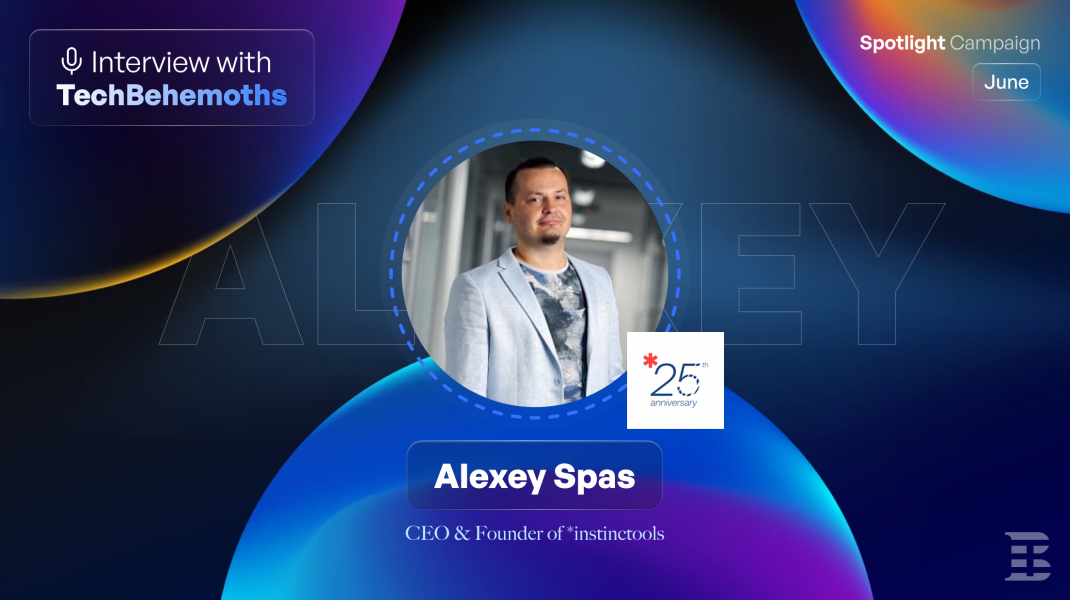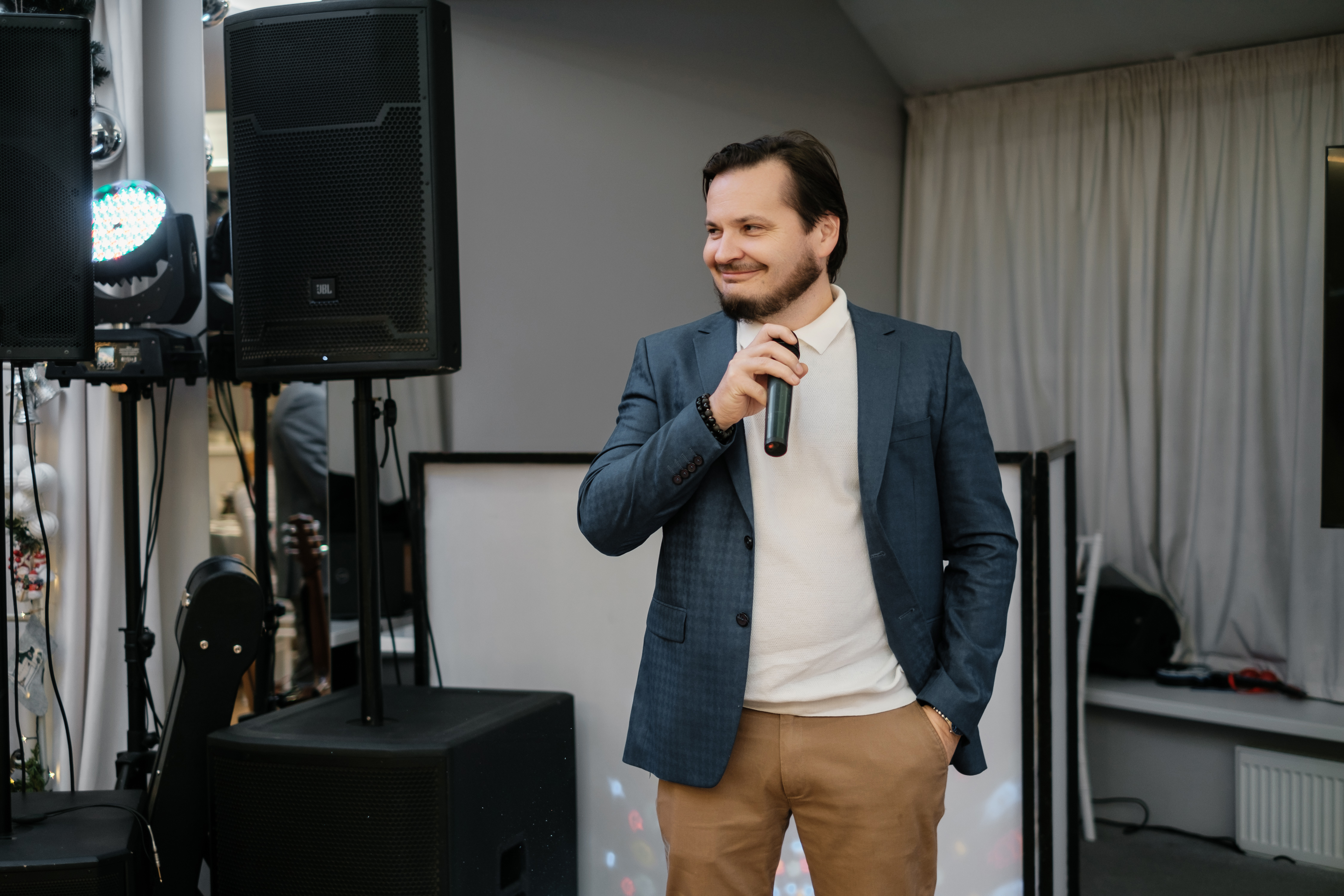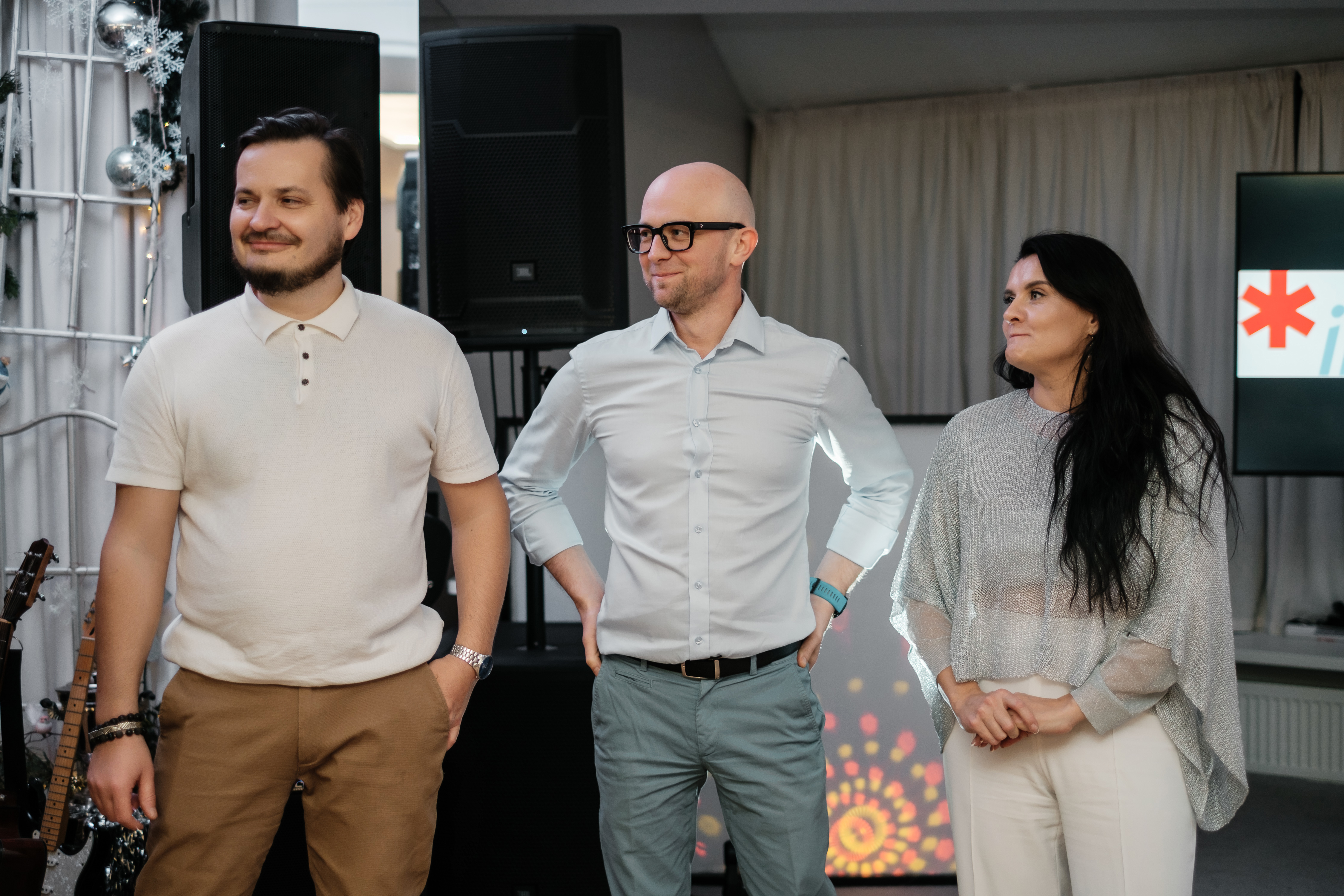A Conversation With Alexey Spas - the Founder of Instinctools

Summary
Alexey Spas, founder of *instinctools, shares how his garage coding startup grew into a global firm with 400 experts.
Since 2000, *instinctools has helped businesses embrace digital transformation using AI and data analytics. Alexey highlights the value of teamwork, adaptability, and a balance between technology and human focus.
Overcoming challenges like market expansion and scaling, he credits strategic thinking and continuous learning for their success. His advice to entrepreneurs: focus on your goals ("why") rather than just the tools, and trust the journey.
What does it take to grow a few students coding in a garage into a 400-strong international software development firm working with Fortune 500 companies?
For the founder of *instinctools, it’s been a journey fueled by curiosity, resilience, and a deep belief in the power of both technology and people. We sat down with Alexey Spas to explore how it all began, what he’s learned along the way, and why he believes the future belongs to those who ask the right questions before writing the code.
Hello Alexey! Welcome to TechBehemoths. To begin, tell us a bit about yourself. How was your childhood, where did you study, and how did your professional journey unfold?
I grew up in Grodno, at the Polish-Belarusian border, where I had a pretty typical childhood, though even then I was drawn to how things worked beneath the surface. After school, I studied metrology at the local university’s Faculty of Physics and Technology. But alongside science, what really lit me up was IT. I spent countless hours exploring programming, fascinated by what computers could do. Later, I pursued an MBA in Pforzheim, Germany, which gave me a new lens on business, leadership, and global markets.
Tell us the story of instinctools' founding. What inspired you to launch the company in 2000?
The *instinctools story began in 1998, when a group of students (myself included) started coding together in my garage. We worked on websites and digital solutions for local businesses. Soon, word spread, and we found ourselves collaborating with German companies, building partnerships that still exist today. In 2000, we officially launched *instinctools with a focus on content management systems and Java development. Over time, we’ve expanded far beyond that into product and process management, business intelligence, artificial intelligence, and more, always adapting to the growing needs of our clients.

What does the *instinctools logo symbolize and how does it reflect your company’s values and vision?
Our star-shaped logo tells the story of our values as a journey where one point leads naturally to the next. It reflects how we move from freedom to responsibility, encouraging people to take initiative, but with accountability at the core. It also represents the flow from individuality to teamwork, where unique talents come together to create something greater than the sum of their parts. And it speaks to the path from development to effective usefulness, because growth only matters when it translates into meaningful results. So, *instinctools’ star is our way to show how we harmonize client ambitions, employee potential, and efficiency to achieve breakthrough outcomes.
What has been your experience in the tech industry over the past 25 years? What key challenges did you face in building and growing *instinctools, and how did you overcome them?
One thing that’s always defined *instinctools is our engineering DNA. We love solving complex problems and building elegant solutions.
But growing the company came with its own challenges. We had to shift from being a tight-knit startup to a structured organization, introducing new management systems, sales, marketing, and more.
Entering new markets meant learning unfamiliar rules and dynamics, sometimes the hard way. We got through it by working as a team, seeking outside perspectives when needed, and carving out time to pause, reflect, and recalibrate. I believe this very ability to take a step back and adjust our course with a steady hand and clear mind has been one of our biggest strengths.
How would you describe the core philosophy or mission of *instinctools that has led the company to success?
Our mission is really about balance. We’re passionate about technology, but equally passionate about people: both the people who work here and the clients we serve.
We invest in our team’s growth, because we believe that when our people thrive, so do our solutions. And we focus on creating technology that doesn’t just exist for its own sake, but that genuinely makes life better for our clients and their customers. It’s that combination of technical excellence, human focus, and client-first thinking that keeps us moving forward.
Instinctools is known for software development and consulting with AI. How do you use advanced technologies like AI and data analytics to solve complex business challenges? Can you share an example where you helped a client through full digital transformation?
Let’s start with what I think is clear to just about everyone by now, but still worth emphasizing to understand where we’re all heading: AI is fundamentally reshaping how businesses operate. It has the potential to transform employees into empowered knowledge workers who guide and harness AI tools to achieve much more than simply carrying out repetitive tasks. But for AI to really deliver value, a company has to be ready. That means having the right digital groundwork: clean, well-organized data and integrated systems that AI can actually work with. We help businesses build that foundation and prepare their operations so that AI can be integrated in ways that create real, lasting impact.
A great example is our client in the eyewear business. We helped them digitize and automate nearly every part of their operations, from ERP and customer systems to information kiosks and production. So now they have a robust digital ecosystem that could easily support AI solutions. With their data and processes well-structured and connected, AI can help them optimize operations, support staff, flag improvements, and act as a controller where needed.
Noticing that many companies aren’t sure how to implement AI in a thoughtful, effective way, we started offering tailored AI Adoption Workshops — hands-on, practical programs designed to assess where a business stands, identify high-impact AI opportunities, and build a clear roadmap for integration. It’s a way to move beyond a standard, hype-driven playbook that doesn’t really work toward meaningful, measurable business results.

With over 400 professionals worldwide, how do you maintain high efficiency and cohesion in a global team? What do you think makes a team truly effective, and how have you achieved that at *instinctools?
Managing a global team is both exciting and challenging. People today often feel a stronger connection to their projects than to the company behind them and we respect that as it remains central to how we work. Our job is to create an environment where people can do great work and feel supported along the way.
An important part of how we do this is our people partners who help ensure employees stay connected, keep growing, and have every chance to succeed.
We also organize team-building activities, create opportunities for cross-project collaboration, and work continuously to strengthen that sense of belonging not just to the project, but to the company itself.
In the end, it’s a complex, multi-faceted process where no single element works in isolation, so it’s rather the combination of everything that makes it effective.
What personal habits or routines most contribute to your effectiveness as CEO?
I make it a priority to stay focused on what really makes the difference. It’s easy to get distracted by the noise, so I block out at least one quiet day each week to reflect and think strategically. And I keep regular touchpoints with the team to stay connected on both the big picture and day-to-day operations. That rhythm keeps me grounded and helps me steer the ship effectively.
Are there any books, podcasts, or mentors that have strongly influenced your leadership style?
You can’t master leadership once and for all. It’s something you keep learning, refining, and growing into. Along my journey, I’ve drawn inspiration from several powerful ideas.
One that has deeply influenced me is the concept from Leaders Eat Last by Simon Sinek, which highlights that a leader’s true role is to create an environment of safety, trust, and genuine care for the team. The Five Dysfunctions of a Team by Patrick Lencioni opened my eyes to how fragile, yet essential, good communication and healthy team dynamics are and how much conscious effort it takes to build and maintain them. And when it comes to what truly drives people, Drive by Daniel H. Pink offers a valuable reminder that beyond paychecks, it’s the chance for autonomy, mastery, and purpose that inspires people to do their best work. All of these shaped my thinking about building teams and creating a culture where people can do their best work.
What key message would you like to share with aspiring entrepreneurs and tech leaders?
Don’t fall in love with technology for its own sake. Technology is just a tool. What makes the real impact is understanding what you want to achieve with it. If you get your “why” right, the “how” will follow.
If you could go back to the year 2000, what advice would you give yourself?
I’d tell myself:
“Trust the process. Keep going. You’re doing the right things, and success will come in its own time.”